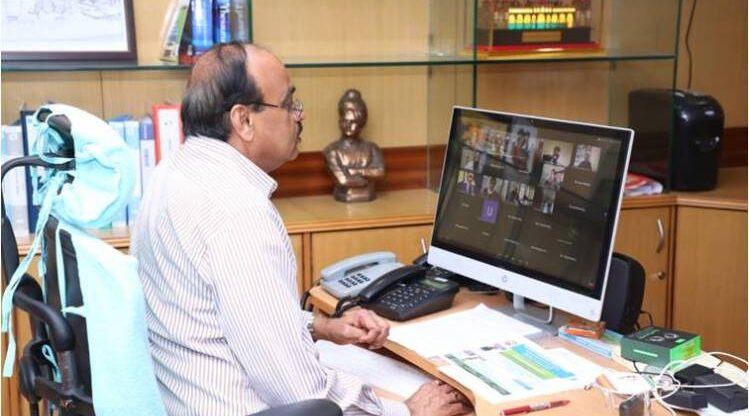The training programme on Innovative Enterprises in Food Sector was organized at UAS, Dharwad on 16.10.2020 and keynote address was delivered by Dr. Kalidas Shetty, Founder Director, Global Institute of Food Security and International Agriculture GIFSIA, North Dakota, USA. He highlighted nutrigenomics and critical flaws in current model and relevance of food crops to health, challenges and concepts to address these flaws. Food security and food quality probably becomes a solution to hunger while preventing non communicable diseases will be a solution to food surplus. Climate adjustment and resilience can be tackled with improved plant species having stress tolerance. Wastage of food can be addressed by preservation and safety. He emphasised the effective human host response for better nutrition and health based on redox linked metabolic biology. The phytochemical rich foods he said could improve the immunity and defense responses and all the oxidation processes were linked to non communicable diseases. The speaker emphasised the use of indigenous food systems for health benefits. Role of indigenous grains, fruits and vegetables in maintaining health, anti diabetic, anti hypertensive properties, bioactive compound in food and health benefits, phenolic compounds in food and therapeutic benefits were explained.
Guest speakers Dr. Prabhodh Halde, Former President of AFSTI, Head regulatory Marico LTD, Mumbai spoke on “Innovative enterprises in food sector and food processing industry”. He mentioned that 75 percent of food processing industry is unorganised small scale sector. Food processing is directly linked to farmers welfare. Optimum processing, wastage utilization, value addition and high shelf life and direct market will double the farmers income. The food technologists have a commendable role to help the farmer in achieving this. Food trends or prospects of food products, Ayurvedic foods, functional convenience foods and traditional foods enhance the opportunities for food technologists. He appealed everyone to stop food wastage and take a pledge on the eve of World Food Day not to “Waste Food in Plate”.
Dr. Vijaya Khader, Former Dean (HSc), PJTSAU, Hyderbad delivered lecture on “Intervention of viable technologies for food, health livelihood and nutrition security”. She talked about the strategies to grow, nourish and sustain to end malnutrition. Her speech concentrated on food technologies for rural sector, food processing industries, innovative enterprises for economic and food security. The speaker emphasised that multisectorial approach to end malnutrition include nutrition sensitive health care, water, sanitation and education, agriculture and specific nutrition interventions and empowerment of women. She explained the role of functional foods such as conventional foods, enriched value added foods, therapeutic and special foods in maintaining nutrition security. Madam emphasised the role of innovative entrepreneurship in attaining economic and nutrition security such as a ghost kitchens, vertical farming, super crops by bio fortification.
Hon’ble Vice Chancellor of UAS, Dharwad Dr. M.B Chetti explained during presidential remarks that before green revolution in pre independence era the food production were very meagre and now India is self sufficient in food production. Now we need to think of nutritional security, especially among the economically insecure populations. Consumption of fruits and vegetables is essential to attain micronutrient security. World Food Day is celebrated every year to mark the foundation day of FAO. Food processing and preservation is very important to prevent food loss. Sir indicated that “A grain saved is a grain produced”. Crop wise food production has to improve and nutrition security needs to be emphasized, foods and crops rich in antioxidants need to be consumed in these days of COVID-19. Climatic changes have become very erratic and will have an impact on food and nutrition security.






